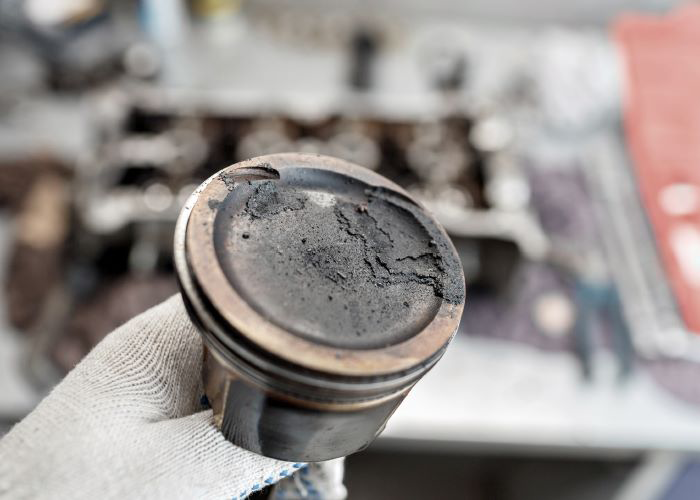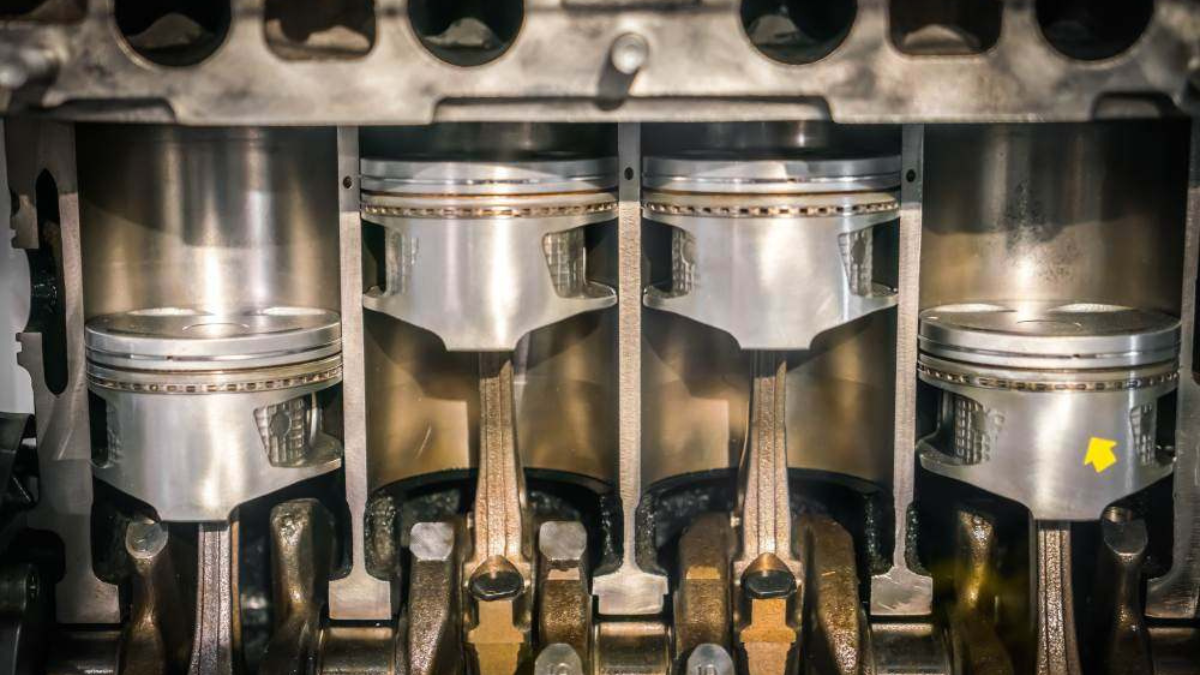Ever felt like your car is speaking to you in Morse code with all those strange noises? Well, buckle up because we’re diving into the wild world of bad piston rings – those sneaky troublemakers causing chaos under the hood. From mysterious smoke signals to power losses that make you question if your ride is on a coffee break, the symptoms of bad piston rings can turn any drive into a rollercoaster ride.
As a car enthusiast, I’ve had my fair share of battles with these pesky piston ring issues. Don’t worry; I’ve got your back with some quick solutions that’ll have your engine purring like a contented kitten in no time. So, grab your wrench, put on your detective hat, and let’s uncover the mysteries of bad piston rings together.
Recognizing Bad Piston Ring Symptoms
So, you’re cruising along, enjoying the wind in your hair and the open road, when suddenly, your car starts acting up. It’s like it has a mind of its own! But fear not, my fellow automotive enthusiasts! Let’s jump into the quirky world of bad piston ring symptoms and how to spot them before they cause a total meltdown.

Excessive Exhaust Smoke
Ah, the telltale sign of trouble – if your car is puffing out more smoke than a chimney on a frosty winter morning, you might have a piston ring issue. It’s like your car is auditioning for the role of a steam engine! Keep an eye (and nose) out for that distinct smoke smell, and remember, your car isn’t supposed to have a BBQ every time you hit the gas pedal.
Declining Engine Performance
Picture this: you’re revving up your engine, ready to feel the power, but all you get is a sluggish response. If your car is giving you less oomph than a deflated balloon at a party, your piston rings could be to blame. It’s like your engine decided to take a nap when you needed it the most – talk about bad timing!
Increased Oil Consumption
Is your car thirsty for oil like it’s hitting the gym for a workout? If you find yourself constantly topping up the oil levels, your piston rings might be guzzling more oil than a teenager at an all-you-can-eat buffet. Keep an eye on those oil levels; your engine shouldn’t be chugging oil like it’s running a marathon!
Unusual Engine Noises
What’s that sound? If your engine is serenading you with a symphony of clanks, knocks, or rattles, it’s time to investigate. Piston ring issues can turn your peaceful drive into a noisy concert you never asked for. It’s like your engine is trying out for America’s Got Talent – but trust me, this isn’t the kind of performance you want a front-row seat to!
Keep your ears perked, your eyes sharp, and your detective hat on, fellow gearheads! Spotting these quirky symptoms early can save you from a world of automotive woes. Remember, when life gives you bad piston rings, just roll with it – and maybe roll into the nearest mechanic for a quick fix!
Common Causes of Piston Ring Failures
Being an automotive detective, I uncover the mysteries behind common causes of piston ring failures. Let’s jump into the suspects:
Wear and Tear
I’ve caught wear and tear red-handed many times! It’s like the silent villain that slowly weakens the piston rings over time, leading to poor sealing and compression. Imagine tiny villains chipping away at the ring’s ability to do its job properly.
Engine Overheating
Ah, overheating – the classic troublemaker in the world of engines! It’s like the engine throwing a temper tantrum, causing the piston rings to lose their temper too. When things get too hot to handle, the rings can warp or distort, creating gaps for trouble to sneak in.
Insufficient Lubrication
Lubrication – the unsung hero of the engine! Without it, the piston rings would be like a knight without armor, vulnerable to friction and wear. Inadequate lubrication can lead to excessive friction, scuffing, and premature wear of the rings, jeopardizing their effectiveness.
Poor Maintenance
Ah, poor maintenance, the neglectful caretaker of engines! It’s like forgetting to feed your pet – the engine suffers when not taken care of. Skipping regular oil changes or neglecting worn-out components can put undue stress on the piston rings, shortening their lifespan and causing them to fail prematurely.
Practical Solutions for Faulty Piston Rings
So, it seems like our trusty piston rings are causing some trouble. Fear not, my fellow car enthusiasts! I’ve got just the solutions you need to tackle this pesky problem head-on. Let’s jump into some practical fixes that will have those piston rings purring like a kitten in no time!
Proper Installation Techniques
Ah, the importance of proper installation can never be overstated, just like making sure your socks match in the morning! When it comes to piston rings, ensuring they are installed correctly is key to their longevity and performance. Think of it as putting together a puzzle – every piece needs to fit snugly for the full picture to come together. So, take your time, follow the manufacturer’s instructions, and don’t rush this crucial step.
Routine Maintenance and Care
Maintenance – the unsung hero of the automotive world! Just like how we need our daily dose of coffee to function, your car craves regular maintenance to keep those piston rings in top shape. Schedule regular check-ups, oil changes, and inspections to nip any potential issues in the bud. Treat your car right, and it’ll return the favor with smooth rides and happy piston rings!
Using Quality Engine Oil
Ah, the lifeblood of your engine – engine oil! Don’t skimp on this essential liquid gold. Quality engine oil not only lubricates those hard-working piston rings but also helps maintain optimal engine performance. It’s like giving your car a luxurious spa day – pamper it with the good stuff, and watch those piston rings thank you with a flawless performance.
Addressing Overheating Issues Promptly
If your engine starts feeling like it’s on fire – and not in a good way – it’s time to address those overheating issues pronto! Overheating can spell disaster for your piston rings, causing them to warp and wear out prematurely. Keep a close eye on your engine temperature gauge, watch out for any warning signs, and act fast to cool things down. Your piston rings will thank you for saving them from a hot mess!
Preventive Measures to Extend Piston Ring Life
I bet you’re wondering, “How can I keep my piston rings in tip-top shape?” Well, fear not, dear reader! I’ve got some tricks up my sleeve that will help you extend the life of those precious piston rings without breaking a sweat.
Regular Oil Changes
Ah, the sweet elixir of life for your engine – oil! Make sure you’re changing it regularly like clockwork. Skipping oil changes is like denying your engine a refreshing spa day. Keep those piston rings happy, and they’ll purr like a kitten.
Maintaining Engine Cooling Systems
Don’t let your engine overheat; it’s a surefire way to upset those piston rings. Keep an eye on your coolant levels and make sure your radiator is in top-notch condition. A cool engine is a happy engine, and happy piston rings mean a smooth ride.
Adhering to Manufacturer’s Guidelines
I know, I know, reading manuals isn’t the most thrilling pastime. But hey, those manufacturer guidelines are there for a reason! Stick to them like glue, and your piston rings will thank you for it. Trust me; it’s worth the read.
Observing Early Symptoms and Taking Immediate Action
If your car starts acting up – weird noises, excessive smoke, or poor performance – don’t ignore these cries for help! Get to the root of the issue pronto. Ignoring early symptoms is like letting a tiny leak sink a massive ship. nip those problems in the bud, and your piston rings will be singing your praises.
Conclusion
Well, folks, there you have it – the lowdown on those sneaky bad piston ring symptoms and their pesky causes. Remember, keeping an ear out for those strange engine noises and keeping an eye on that exhaust smoke can save you a world of trouble down the road. It’s like being a detective, but with cars instead of crime scenes! So, don’t let those villains like wear and tear and overheating weaken your piston rings. Stay on top of your car maintenance game, use quality oil, and tackle any overheating issues head-on. Your piston rings will thank you with smooth rides and purring engines. Happy driving, and may your piston rings stay strong and snug for miles to come!
Frequently Asked Questions
How do I identify bad piston ring symptoms in my car?
Signs of bad piston rings include exhaust smoke, engine performance decline, oil consumption, and unusual noises. Early detection is crucial to prevent further damage.
What are common causes of piston ring failures?
Common causes include wear and tear, engine overheating, insufficient lubrication, and poor maintenance. These factors weaken the piston rings over time.
What are practical solutions for faulty piston rings?
Practical solutions include proper installation techniques, routine maintenance, using quality engine oil, and addressing overheating promptly. Vigilance and proactive maintenance are key.
How can I extend the life of my piston rings?
To extend piston ring life, practice regular oil changes, maintain engine cooling systems, follow manufacturer’s guidelines, and take immediate action upon noticing early symptoms.
What are the risks of driving with bad piston rings?
Driving with bad piston rings can lead to further engine damage, performance issues, increased emissions, and higher fuel consumption. It is essential to address piston ring issues promptly.

